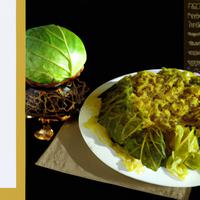
1 serving (100 grams) contains 25 calories, 1.3 grams of protein, 0.1 grams of fat, and 5.1 grams of carbohydrates.

Log this food in SnapCalorie

Nutrition Information
Calories |
59.5 | ||
|---|---|---|---|
% Daily Value* |
|||
| Total Fat | 0.2 g | 0% | |
| Saturated Fat | 0 g | 0% | |
| Polyunsaturated Fat | 0 g | ||
| Cholesterol | 0 mg | 0% | |
| Sodium | 42.9 mg | 1% | |
| Total Carbohydrates | 12.1 g | 4% | |
| Dietary Fiber | 4.8 g | 17% | |
| Sugars | 5.5 g | ||
| protein | 3.1 g | 6% | |
| Vitamin D | 0 mcg | 0% | |
| Calcium | 95.2 mg | 7% | |
| Iron | 1.2 mg | 6% | |
| Potassium | 547.6 mg | 11% | |
* Percent Daily Values are based on a 2,000 calorie diet. Your daily values may be higher or lower depending on your calorie needs.
Food Attributes
Source of Calories
About Wild cabbage
Wild cabbage, also known as Brassica oleracea, is a leafy green vegetable native to the coastal regions of Europe. Its robust and slightly bitter leaves have been a staple in various traditional cuisines, particularly Mediterranean and European dishes. Wild cabbage is rich in essential nutrients, including vitamin C, vitamin K, calcium, and potassium, making it a heart-healthy and bone-strengthening addition to your diet. It’s also a good source of dietary fiber, which supports digestion and helps maintain a healthy gut. Additionally, it's packed with antioxidants that combat oxidative stress and support overall cellular health. While naturally low in calories and fat-free, its raw form may contain goitrogens, which, if consumed in large quantities, could affect thyroid function in sensitive individuals. Whether sautéed, steamed, or added to soups, wild cabbage is a versatile, nutrient-dense option for wholesome cooking.



